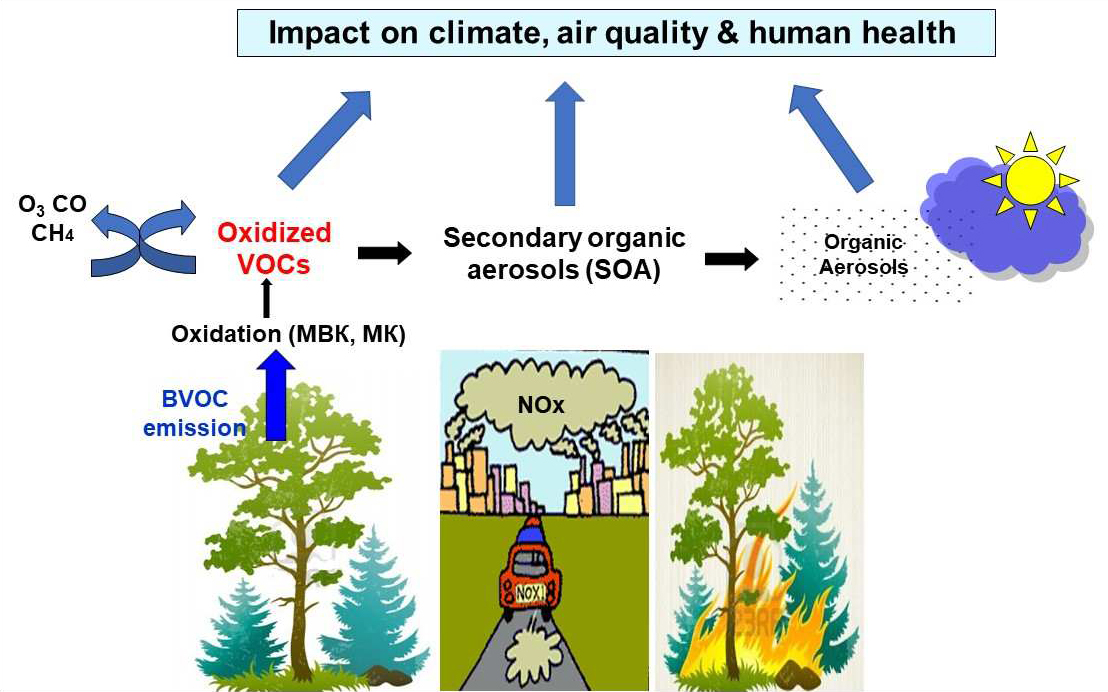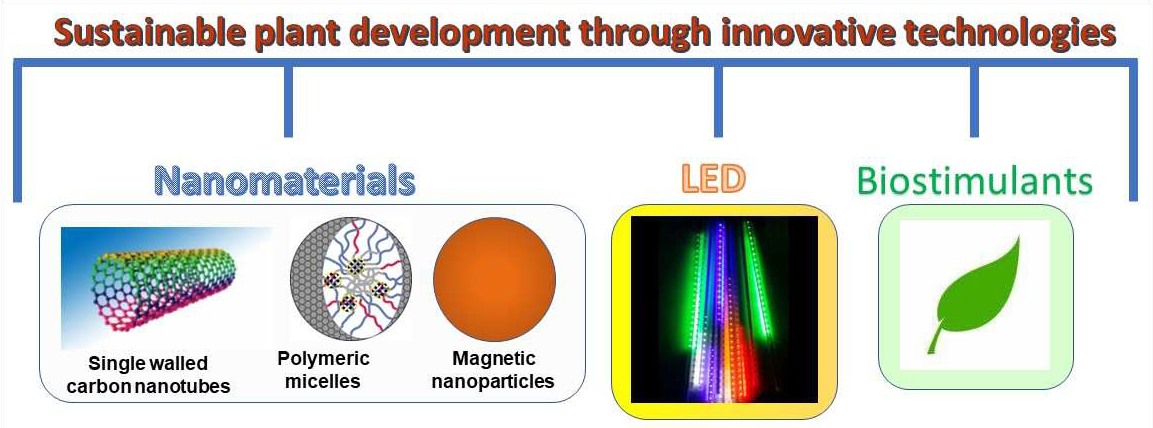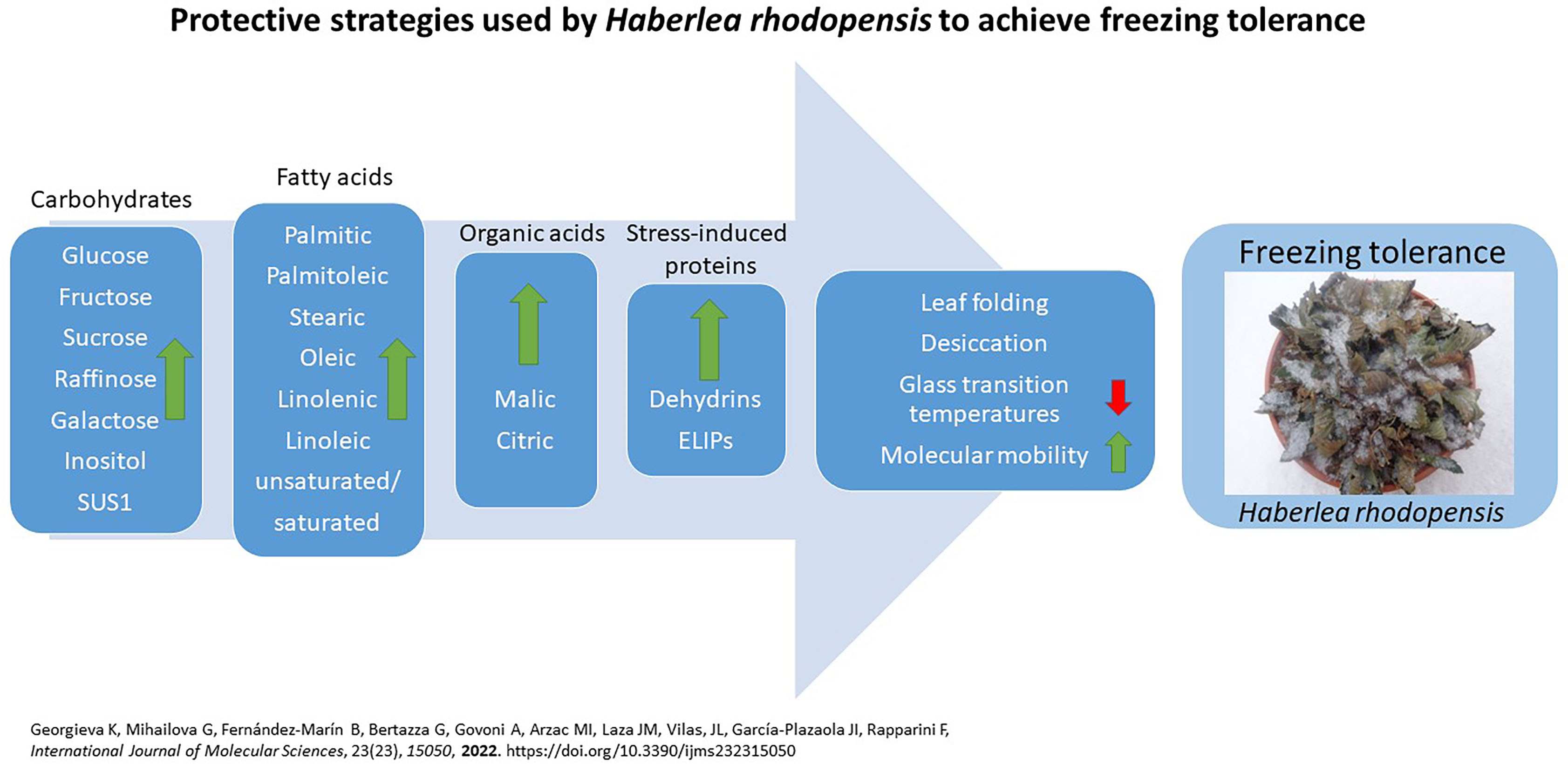Laboratory “Photosynthesis – Activity and Regulation”
 |
LeaderCorresp. member Violeta Velikova, DScBldg. 21, Office 109 |
PRIORITY AREAS OF RESEARCH
We conduct targeted fundamental research oriented towards possibilities for long-term practical applications. The objectives of our studies perfectly fit the main broad lines of research addressed in the Horizon Europe framework program of the European Commission (EC), specifically dealing with Food, Bioeconomy, Natural Resources, Agriculture and Environment. They are directly related to the societal challenges defined in the National Strategy for Research Development in the Republic of Bulgaria 2017-2030, in particular: “improving the quality of life – food, health, biodiversity, environmental protection, urban environment, transport”, “increasing the competitiveness and productivity of the economy” and “efficient utilization of natural resources”.
The structural organization and the mechanisms of functioning of the photosynthetic apparatus in response to different environmental stresses (high and low temperatures, increased CO2 concentration, drought, salinity, heavy metals, UV-radiation) with a focus on the mechanisms of adaptation and defense, represent the major field of research in the Department of Photosynthesis – activity and regulation. Investigations have been conducted on the impact of changing climatic factors on primary and secondary plant metabolism. The physiological role of volatile and non-volatile isoprenoids, lipid and fatty acid composition, as well as other metabolites involved in plant defense are also studied. We are applying modern imaging techniques like chlorophyll fluorescence and thermal imaging, photosynthetic gas exchange, thermoluminescence, PCR and qPCR, SDS – PAGE, Blue Native PAGE, Western blot, analyses of various markers of oxidative stress and activity of antioxidant defense system.
 Physiological phenotyping. Primary and secondary plant metabolism under climate changes
Physiological phenotyping. Primary and secondary plant metabolism under climate changes
Our research efforts are focused on the impact of changing climatic factors and anthropogenic pollution on photosynthesis. Based on analyses of CO2 and H2O exchange and chlorophyll fluorescence parameters we study the limiting steps leading to decreased photosynthetic productivity under adverse conditions. Our research group is also studying phenotypic differences between plant populations from contrasting environments for identification of putative stress-responsive metabolites and on the understanding mechanisms of plant adaptation to stress conditions. In parallel with the primary metabolism we study the changes in the secondary metabolism of plants with a focus on biogenic volatile organic compounds. Exploring the relationship biogenic emissions – environment we aim at selecting the most environmentally friendly plant species to be used for landscape architecture and afforestation of areas with different levels of pollution, which in turn is related to air quality.
Sustainable plant development in changing environment
We explore different high-tech and innovative approaches for increasing the quality and quantity of plant production. Through innovative technology (e.g. LED) we aim to develop more sustainable plant genotypes with increased levels of natural secondary metabolites, which are an important raw material for the food and pharmaceutical industries. The focus of our research is also on the application of innovative agrotechnical substances by the group of biostimulants (plant protein hydrolysates) and nanomaterials (carbon nanotubes, biocompatible polymer nanoparticles and magnetite), their physiological effects and the possibilities for overcoming adverse abiotic factors. A wide range of research methods are applying, including modern imaging methodologies (fluorescence and thermal imaging) widely used in plant phenotyping.
 Mechanisms of desiccation tolerance of plants under changing environmental conditions
Mechanisms of desiccation tolerance of plants under changing environmental conditions
The resurrection plant Haberlea rhodopensis Friv. (Gesneriaceae) is used as a model system for elucidation of the mechanisms of desiccation tolerance under changing environmental conditions. We investigate the acclimation mechanisms at different levels of organization of the photosynthetic apparatus (whole leaf, isolated chloroplasts) using physiological, biophysical and biochemical approaches. Special attention is focused on the relationship between the extent of stress treatment and the level of some stress markers, on the structure and functionality of the photosynthetic apparatus, activity of antioxidant defense system, the synthesis of stress-induced proteins (HSPs, Dehydrins, ELIPs), the changes in pigment-protein complexes, the main PSI and PSII proteins, and the expression of specific genes upon stress treatments.
Primary photosynthetic reactions, abiotic stress and the role of biologically active substances (polyamines, salicylic acid, ABA, nitric oxide)
Our efforts are emphasized on the interrelation between structural organization and functional activity of the photosynthetic apparatus, regulation of photosynthetic electron and proton transport under optimal and stress conditions (drought, including extreme drought, salinity, changes in the light spectral composition, UV-B radiation effects, heavy metal pollution, etc.). Different crops and medicinal plants of great economic importance as well as plants and microalgae tolerant to a certain type of abiotic stress have been used as model systems. The effects of some biologically active compounds (polyamines, salicylic acid, ABA and nitric oxide) in the process of adaptation of crop plants to abiotic stresses are also studied. Various biophysical and biochemical approaches have been applied in our research, including chlorophyll fluorescence, thermoluminescence, redox kinetics of Р700, oxygen evolution, pigment content, changes in some enzymatic and non-enzymatic components of plant antioxidant defense system.
 Research Projects
Research Projects
 More Significant Research Achievements
More Significant Research Achievements
 Scientific Publications
Scientific Publications
Research Team
 |
Violeta Velikova – Corresponding member, DSc Office 109, lab. 215 Tel. (+359 2) 979 26 83; (+359 2) 979 26 04 Е-mail: violet@bio21.bas.bg ORCID ID: 0000-0002-3058-919X ResearcherID: AAE-3251-2021 Research Gate: Violeta Velikova Professional interests: Agronanothechnology, plant stress physiology, phenotyping, biogenic volatile organic compounds, photosynthesis, chlorophyll fluorescence, metabolomics, proteomics, oxidative stress. |
 |
Katya Georgieva – Professor, PhD Office 205, Lab. 116 Тел. (+359 2) 979 26-20, (+359 2) 979 26-88 E-mail: georgieva.katya.m@gmail.com; katya@bio21.bas.bg; katyamg@yahoo.com ORCID: 0000-0002-5509-3801 Research Gate: Katya_Georgieva Professional interests: Abiotic stress, acclimation, resurrection plants, photosynthesis, chlorophyll fluorescence, antioxidant enzymes, stress-induced proteins, gene expression. |
 |
Gergana Mihailova – Associate Professor, PhDOffice 305, Lab. 116 |
 |
Violeta Peeva – Assistant Professor, PhDOffice 305, lab. 328 |
 |
Dilyana Doneva – Assistant Professor, PhDLab. 302 |
 |
Vladimir Aleksandrov – Assistant Professor, PhD
Lab. 304 |
 |
Daniel Ilkov – MScLab. #304 |
 |
Eva Popova – MScLab. #116 |



